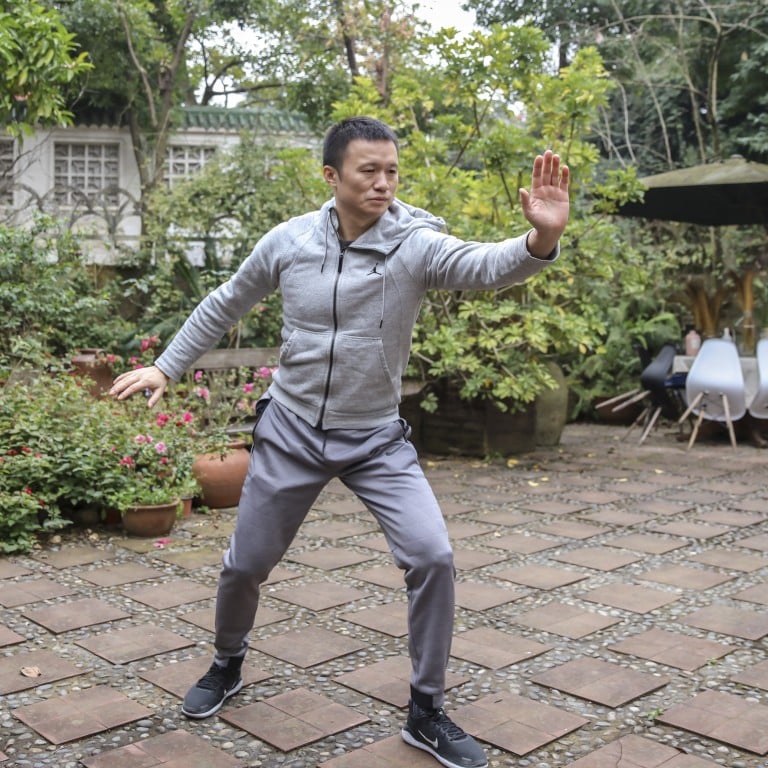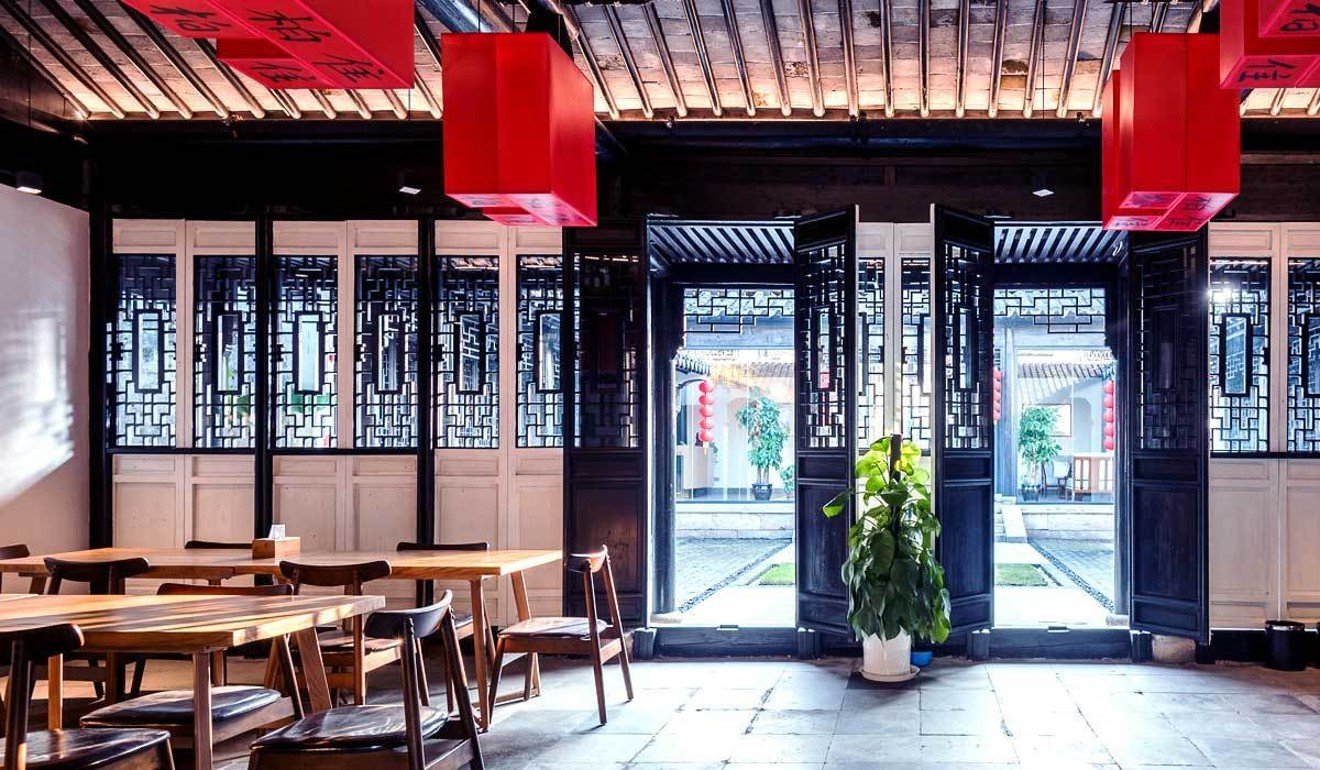
Exclusive | Tai chi with the Post: Xiaozhu founder Kelvin Chen on handling stress and taking on Airbnb
- This is the latest instalment of an occasional series where Post reporters engage news makers in an activity of their choice
Kelvin Chen Chi, the gynaecologist-turned-founder of Chinese online home-rental company Xiaozhu, has lost 11 kilograms (24lbs) since we last met a year ago.
The pounds have come off as a result of a rigorous regimen of jogging, rope-jumping and rec-league basketball. And since last year, the Sichuan native has added tai chi to the routine.
Founded in 2012, Xiaozhu is one of Airbnb’s most formidable rivals in China, with half a million listings and 35 million active users. But it competes in a crowded field with contenders like Ctrip-backed Tujia and Meituan Dianping’s Zhenguo.
“Running your own start-up business is like climbing up a mountain without enough oxygen,” Chen, 44, said in an interview in his hometown Chengdu, which Xiaozhu has chosen to be its second headquarters after Beijing.
“You are at risk all the time and you need to be careful about every step you make,” he said. “I sometimes feels very tired and it feels like my brain has stopped working. It is a reflection of both stress and age.”
We had arranged to practice tai chi together at a European-style villa in suburban Chengdu, owned by an artist couple and one of the most popular listings on Xiaozhu. Dressed in light-grey Nike athleisure wear, Chen was half an hour early to our 9am meeting and we were 10 minutes into a silent meditative state of slow, fluid movements in the villa’s courtyard when I realised that tai chi was not exactly conducive to an interview.
Still, I could see the attraction of this ancient Chinese art: the cares and worries of the world fade away when one focuses solely on breathing and movement. For a tech start-up founder in an industry infamous for its 996 culture – shorthand for “nine-to-nine, six days a week” – tai chi could provide a reprieve from the relentless grind. But with the temperature hovering at 6 Celsius (43°F), it was not easy to hold onto the mindfulness.
We were both glad to retreat into the stylish villa and talk over Japanese-style fruit tea. Unlike many other founders and business leaders, Chen comes across as a humble person and is not afraid to admit that he feels stressed and anxious at times.

Ten years before founding Xiaozhu, Chen quit his job as a gynaecologist at the age of 28 because a career in medicine was predictable, like “swimming in a pool with clearly demarcated boundaries.” He cycled through a number of jobs, including as a sales representative for a pharmaceutical company and at 3721 internet Assistant, which was later acquired by Yahoo.
When he first started Xiaozhu in 2012, there were so few listings that he would badger all of his relatives, including his mother (even reporters who interviewed him), to list their homes on the platform. Till today, his wife is an active Xiaozhu host. When Chen and his employees travel, they stay only in Xiaozhu-listed flats.
Xiaozhu was among one of the first platforms in China that offered free smart locks with one-time passwords, saving hosts the trouble of delivering keys in person. Even in the early days, the company had a big customer service team that performed on-site visits to check the conditions of listed flats and suggest improvements. It also set up a call centre with human operators who answered questions from both guests and hosts seven days a week, as in China they require “more hand-holding”.
Xiaozhu raised almost US$300 million in a funding round in October, led by e-commerce tycoon Jack Ma’s Yunfeng Capital. That further entrenched its position as one of 186 start-ups in China with a private valuation exceeding US$1 billion. But even with the funding, Chen is not taking it easy.
“Do you know, on average, a Chinese start-up can only last five years?” he asked rhetorically. When I asked what his goal was for Xiaozhu. “Twenty years” was the reply.
That may not seem very ambitious until you remember that China’s three internet giants Baidu, Alibaba Group Holding and Tencent Holdings, collectively known by the acronym BAT, were all founded about 20 years ago. Chen believes that as a goal, two decades is challenging enough as entrepreneurs need to overcome the ups-and-downs of the economy.

The current slowdown in China’s economy is very much on Chen’s mind. The country’s 4.5 trillion yuan (US$669 billion) domestic tourism industry will probably be one of the first areas to feel the impact, he said.
Many are predicting a shakeout of weaker start-ups with the end of gigantic funding rounds and as anxiety rises over the US-China trade war. To ensure that it will survive, Chen is pushing the company to move from earning fees by matching host and guest, to becoming a full-service provider for property owners.
The property bubble over the past decade has resulted in a glut of empty flats that owners are now seeking to rent out with the downturn.
To address this need, Xiaozhu is building a national network of freelance interior designers, cleaners, photographers and other services providers to help people list, clean and manage their properties.
“We want to completely decouple homeowners from their homes,” Chen said.
Chen admits that he is a worrier and muses that perhaps he should “use my heart more often than the brain.”
He enrolled himself last year in Hupan University, the business school founded by Alibaba executive chairman Ma for entrepreneurs, in the hope of gaining new perspectives. That was also where he picked up tai chi. New York-listed Alibaba owns the South China Morning Post.
As our interview drew to a close and we prepared to depart, Chen kept emphasising that he has only picked up the form of tai chi, rather than its spirit. That was him being modest. As for me, I think I’ll just stick to chocolate and ice cream for stress relief.

